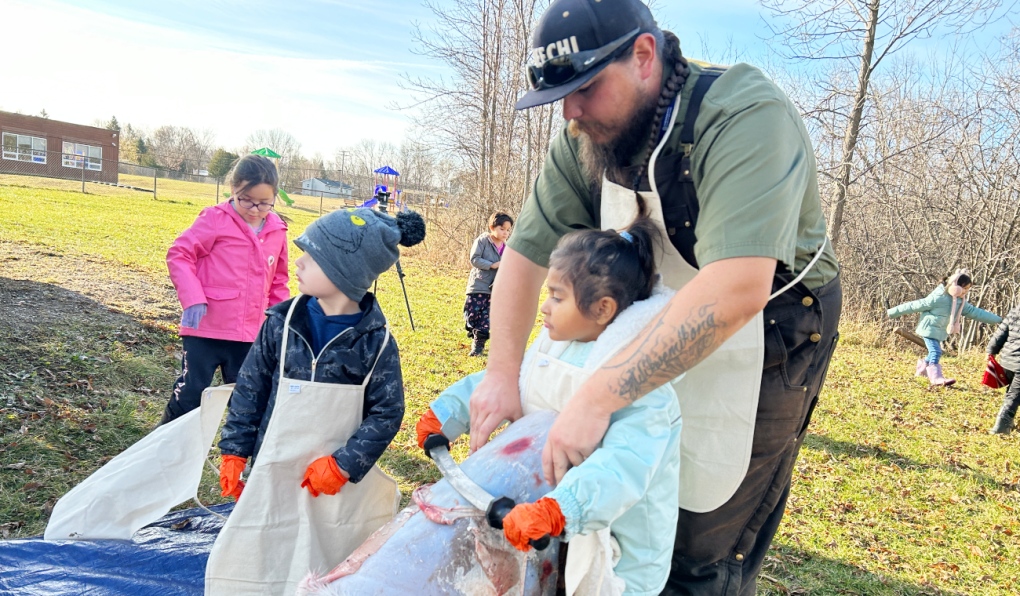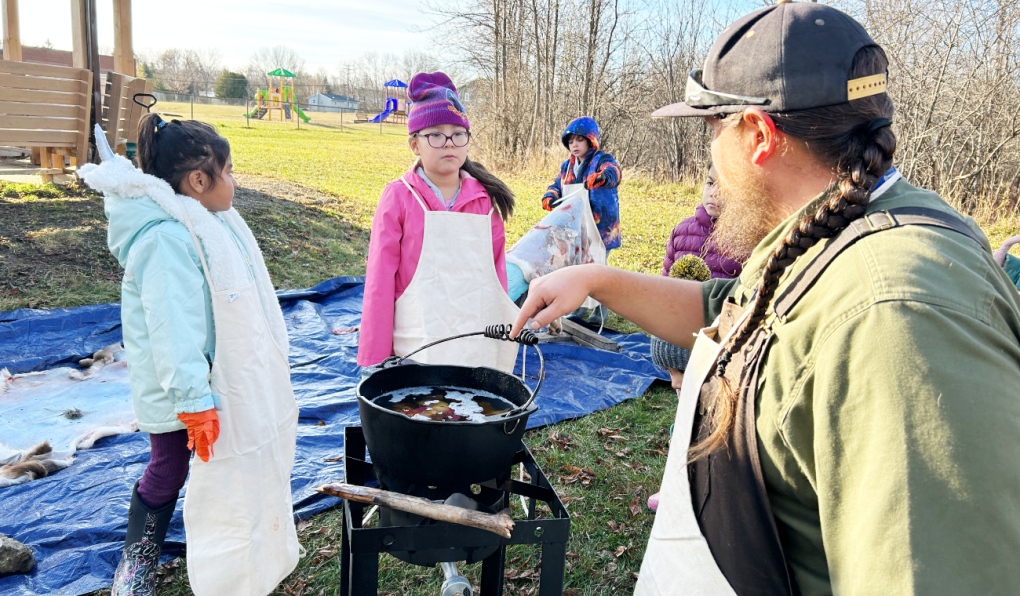Manitoulin Island's land-based learning improves literacy skills for students
Students on Manitoulin Island's Wiikwemkoong First Nation are enhancing their reading and writing skills through land-based learning.
All three schools in the Wiikwemkoong Board of Education are participating in the learning, which can range from tracking, hunting and other activities based on the season.
It's a research project through the Social Sciences and Humanities Research Council at the University of Toronto that's been held in communities in northern Ontario, Alberta, the Northwest Territories, extending as far as Sweden and New Zealand.
The research involves hearing from teachers and the findings of land-based learning, and how it benefits reading and writing.
"We start with the questions, the interest, the issues that are important to the teachers and all the teachers," said Shelley Stagg Peterson, professor in the Department of Curriculum Teaching and Learning OISE/ University of Toronto.
On Thursday, Kindergarten students at Wiikwemkoong Junior School learned about skinning a deer and the cultural practices involved in the process.
Students then headed inside to write and draw about what they learned.
"We're taking the kids outside of the classroom and giving them opportunities to demonstrate their learning in a more meaningful, cultural way," said Craig Cress, school principal.
Jacinta Manitowabi, teacher at the school, helped develop the second part of the NOW Play project, which involved Indigenous teachings.
 Students on Manitoulin Island's Wiikwemkoong First Nation are enhancing their reading and writing skills through land-based learning. All three schools in the Wiikwemkoong Board of Education are participating in the learning, which can range from tracking, hunting and other activities based on the season. (Amanda Hicks/CTV News)
Students on Manitoulin Island's Wiikwemkoong First Nation are enhancing their reading and writing skills through land-based learning. All three schools in the Wiikwemkoong Board of Education are participating in the learning, which can range from tracking, hunting and other activities based on the season. (Amanda Hicks/CTV News)
 Students on Manitoulin Island's Wiikwemkoong First Nation are enhancing their reading and writing skills through land-based learning. All three schools in the Wiikwemkoong Board of Education are participating in the learning, which can range from tracking, hunting and other activities based on the season. (Amanda Hicks/CTV News)
Students on Manitoulin Island's Wiikwemkoong First Nation are enhancing their reading and writing skills through land-based learning. All three schools in the Wiikwemkoong Board of Education are participating in the learning, which can range from tracking, hunting and other activities based on the season. (Amanda Hicks/CTV News)
Manitowabi said students are demonstrating success in reading and writing at just five years old.
"They're forming letters, they're putting sounds together to form words and it better prepares them for Grade 1," she said.
Keagan Manitowabi-Turner, five years old, said he enjoyed the experience.
"I like land-based learning," Keagan said. "It's fun."
Manitowabi said it’s the lived experience that makes it so impactful for students.
"You can ask them what they did on the weekend or something about winter, but unless they experience it and you get to them to write about it immediately, they don’t want to write," she said.
"But if it’s something they just finished doing, they're excited about it, they're motivated to write their story and draw."
Nathan Bryant, land-based learning instructor, said it's important for students to connect with nature and culture at an early age.
- Download our app to get local alerts on your device
- Get the latest local updates right to your inbox
"We may not have the creature comforts we do now, such as the stores, hydro, the electricity, the running water, so I think it’s important to learn these skills at a very young age," Bryant said.
"Being part of the First Nations, it's part of our culture and unfortunately, a lot of it’s been lost and we're trying to bring that back, getting back to the land, teaching from the land, what we learn from Mother Nature."
Due to its success, land-based learning will be a part of the school curriculum, making changes and adjustments based on students' responses.
CTVNews.ca Top Stories

Trump threatens to try to take back the Panama Canal. Panama's president balks at the suggestion
Donald Trump suggested Sunday that his new administration could try to regain control of the Panama Canal that the United States “foolishly” ceded to its Central American ally, contending that shippers are charged “ridiculous” fees to pass through the vital transportation channel linking the Atlantic and Pacific Oceans.
Man handed 5th distracted driving charge for using cell phone on Hwy. 417 in Ottawa
An Ottawa driver was charged for using a cell phone behind the wheel on Sunday, the fifth time he has faced distracted driving charges.
Wrongfully convicted N.B. man has mixed feelings since exoneration
Robert Mailman, 76, was exonerated on Jan. 4 of a 1983 murder for which he and his friend Walter Gillespie served lengthy prison terms.
Can the Governor General do what Pierre Poilievre is asking? This expert says no
A historically difficult week for Prime Minister Justin Trudeau and his Liberal government ended with a renewed push from Conservative Leader Pierre Poilievre to topple this government – this time in the form a letter to the Governor General.
opinion Christmas movies for people who don't like Christmas movies
The holidays can bring up a whole gamut of emotions, not just love and goodwill. So CTV film critic Richard Crouse offers up a list of Christmas movies for people who might not enjoy traditional Christmas movies.
More than 7,000 Jeep SUVs recalled in Canada over camera display concern
A software issue potentially affecting the rearview camera display in select Jeep Wagoneer and Grand Cherokee models has prompted a recall of more than 7,000 vehicles.
'I'm still thinking pinch me': lost puppy reunited with family after five years
After almost five years of searching and never giving up hope, the Tuffin family received the best Christmas gift they could have hoped for: being reunited with their long-lost puppy.
10 hospitalized after carbon monoxide poisoning in Ottawa's east end
The Ottawa Police Service says ten people were taken to hospital, with one of them in life-threatening condition, after being exposed to carbon monoxide in the neighbourhood of Vanier on Sunday morning.
New York City police apprehend suspect in the death of a woman found on fire in a subway car
New York City police announced Sunday they have in custody a “person of interest” in the early morning death of a woman who they believe may have fallen asleep on a stationary subway train before being intentionally lit on fire by a man she didn't know.


































